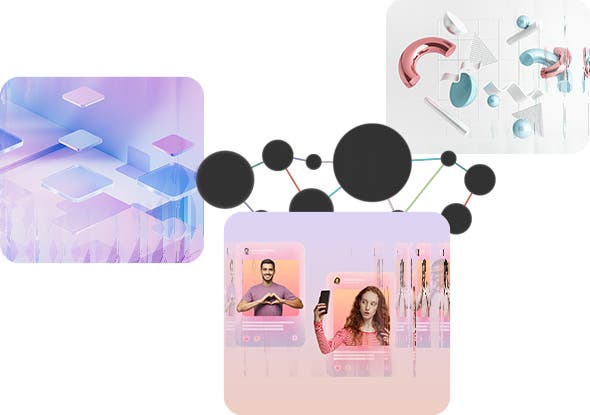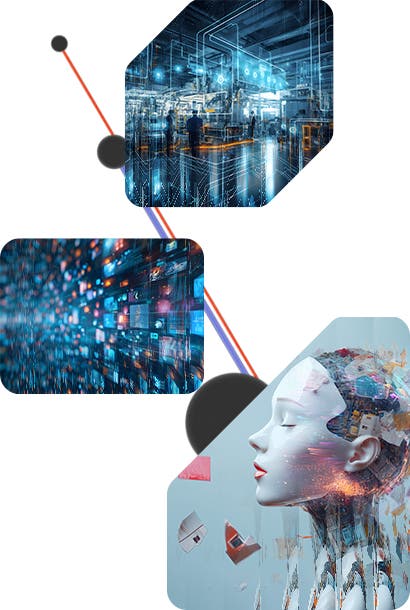From Creator Economy to Imagination Economy.
The democratization of creativity—powered by accessible tools like Adobe’s suite, Canva, and countless others—has transformed the way individuals produce and share content with ease. Now, Artificial Intelligence is poised to redefine this further. AI will not only automate tasks like scriptwriting, design, or editing but also free creators to focus on higher-order activities such as strategy and community engagement.
This shift marks the dawn of the Imagination Economy, where AI moves beyond supporting human creativity to autonomously tailoring content without human intervention. Fuelled by advancements like quantum computing, this economy will give rise to tools of unprecedented power, accelerating creative possibilities and reshaping how we engage with content.
0
Of CMOs agree that Generative AI represents the future of advertising and marketing.2
0
AI-generated content is projected to constitute 90% of online content by 2026.3
0
Of video content is expected to be AI-assisted by 2025.4
The Evidence
Instead of just using AI to enhance or optimize creative outputs (images, videos, etc.), AI will increasingly create economic value autonomously, dreaming up ideas and content without human intervention. One of the highest-paid creators worldwide, MrBeast is a testament to this trend, who utilised YouTube’s AI translation offering Aloud, translating 11 top-viewed videos into 11 languages. Instead of creating and maintaining separate YouTube channels for various language-speaking audiences, he operates one single channel, with the videos automatically playing for users in the language spoken in their region of the world. In addition to growing his audience, it became a way to multiply earnings from ad revenue sharing across regions, increasing the power, autonomy and influence of his brand and media platform.

The Impact
As AI becomes better at not only generating content but also generating new ideas, the focus will shift from human-driven creation to AI-driven imagination. If the past few years were about the Attention Economy—dominated by human-generated content—soon we will see AI creating content on demand, tailored to our individual tastes and preferences, without any human input.
The rise of the Imagination Economy signals a fundamental shift in how content is ideated, created, and consumed:
From Attention Economy to Imagination Economy
AI is not only enhancing human creativity but also becoming a self-sufficient creator, moving us from an era dominated by human-generated content to one where AI autonomously tailors content to individual preferences. Consumers will no longer search for content—they’ll experience personalized books, movies, and games generated in real time to suit their unique tastes.
Redefining the Role of Creativity
The role of human creativity will evolve. Instead of focusing on producing content, creators and marketers will focus on orchestrating and overseeing the processes by which AI generates imaginative and original outputs.
Challenges in Intellectual Property
As AI becomes a primary content generator, questions about ownership and intellectual property rights will gain prominence. How brands navigate these challenges will define their ability to capitalize on AI-driven creativity while protecting their unique identity.
Shifts in Consumer Expectations
Consumers will expect more immersive and personalized content experiences, making static or generic content less appealing. AI's ability to produce dynamic and interactive outputs will become a new standard for engagement.
The Opportunity
In the near future, AI will generate entire books, TV shows, movies, and even video games from scratch, fully customized for us, eliminating the need to "search" for entertainment. This has huge implications for brands to lean into the imagination economy and start to develop their own IP without the need for traditional heavy overheads.
The Imagination Economy opens up a wealth of possibilities for brands to innovate, scale, and engage audiences in unprecedented ways:
- Scalable Content Creation: AI eliminates many of the traditional barriers to content creation, such as time, cost, and resource constraints. Brands can now produce high-quality, customized content on demand without the need for traditional production overheads.
- Developing Proprietary IP: AI enables brands to generate unique intellectual property—whether it’s a fully AI-written novel, an interactive video game, or an AI-produced marketing campaign. These IP assets can drive deeper consumer engagement and open up new revenue streams
- Building Competitive Advantage: Early adopters of AI-driven creativity will gain a significant edge over competitors, establishing themselves as pioneers in innovation and customer-centric experiences.
- Multi-layered co-creation: the concept of fandom will have evolved into a multi-layered, immersive experience, enriched by technology, and driven by a sense of participatory co-ownership that blurs the lines between creators and fans.

Take Action
By embracing these strategies, companies can position themselves as leaders in the emerging Imagination Economy, where AI drives both creativity and economic value, empowering brands to innovate without the traditional constraints.
Experiment with AI-Driven Content Creation Tools
Brands should begin experimenting with AI-driven content creation tools to explore new ways of ideating and generating unique assets. Whether for marketing campaigns, product designs, or even original intellectual property (IP), AI can assist in generating ideas and initial drafts quickly. Early adopters will have a competitive edge in using AI to develop innovative concepts, while maintaining brand identity and creativity.
Invest in AI Capabilities
Allocating resources towards AI-driven content creation can streamline production processes and reduce costs, aligning with the projected increase in AI-assisted content.
Develop Ethical Guidelines
Establish frameworks to ensure the ethical use of AI in content creation, addressing potential concerns related to authenticity and intellectual property rights.
Upskill Teams
Provide training for teams to effectively utilize AI tools, fostering a collaborative environment between human creativity and AI capabilities.
Leveraging Dentsu's Expertise
Dentsu has deep capabilities in developing Integrated Growth Solutions that combine unique capability sets for brands to take advantage of. From content ideation to automation, Dentsu’s tools and methodologies allow brands to leverage AI to its full potential.
Have a question for the team?
Leave us your details and a member of our team will get back to you as soon as possible.
Thank you!
Your details were submitted successfully.
There was a problem!
It seems there was an error submitting your details. Please try again later.
Thank you!
Related Thought-Leadership
Dentsu Creative 2025 Trends Report: Fragment Forward
Ahead 2024: Branding Beyond Impact by dentsu X
2024 CXM Imperatives: From Customer Engagement to Empower...
Return to the Year in View 2025 Homepage
Return to Homepage
[1] Dentsu (2024), Consumer Vision 2035: From Insight to Foresight. [2] Dentsu Creative (2024), CMO Report 2024. [3] Europol (2022), Facing reality? Law enforcement and the challenge of deepfakes, an observatory report from the Europol Innovation Lab, Publications Office of the European Union, Luxembourg. [4] Joydeep Bhattacharya (2024), AI Content Creation Statistics: Marketing Predictions for 2025. SEO Sandwitch.
Disclaimer:
- The access and use of the information contained in this article is subject to our site terms and conditions linked below.
- Nothing in this article is intended to be or should be construed as an endorsement or promotion of AI, generative AI (GAI) including of any particular AI or GAI tool by dentsu. Readers should undertake their independent assessment (including from a legal and ethical perspective) before using or advising on the use of any of the foregoing. Please also see our terms and conditions linked at the bottom of this page.
